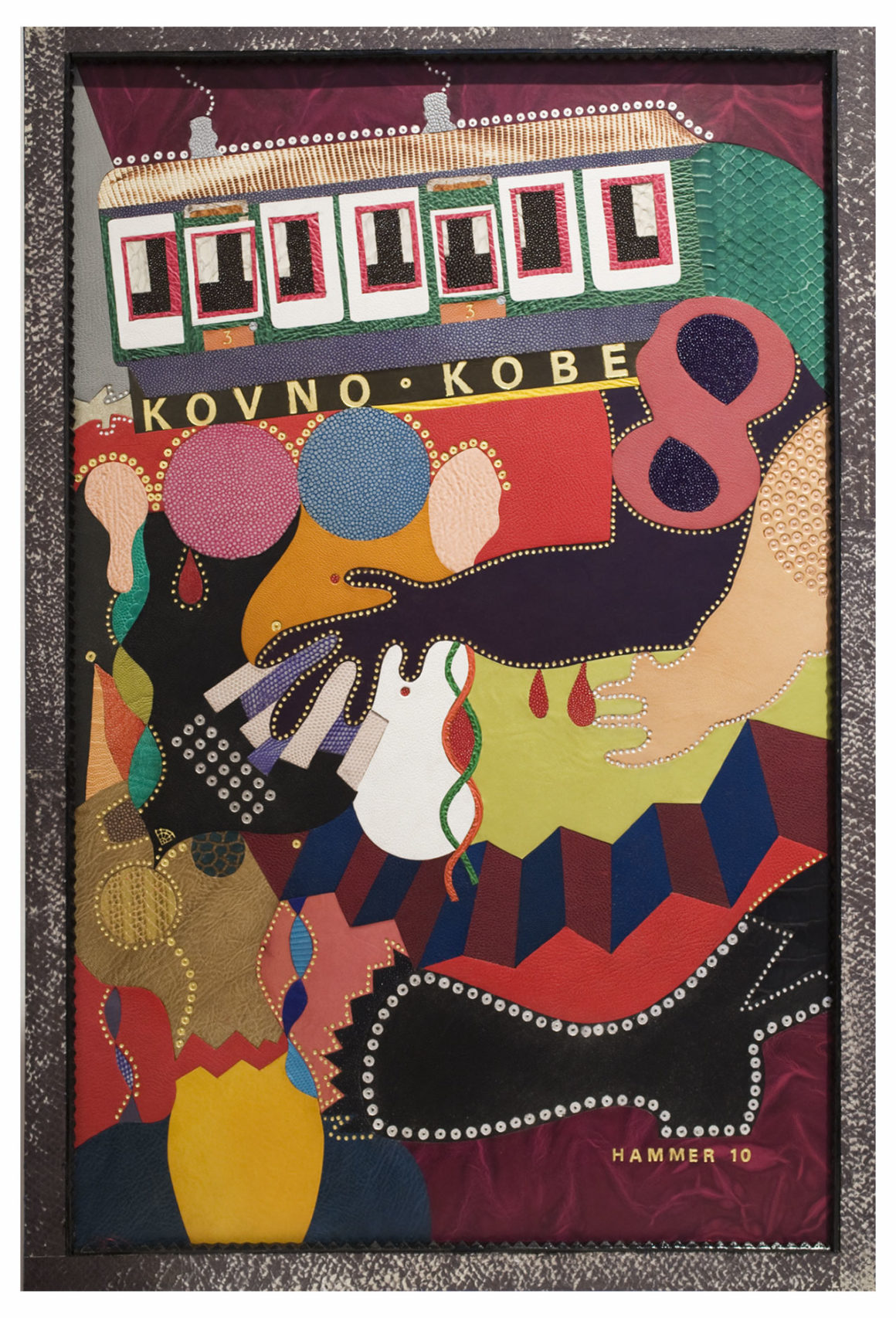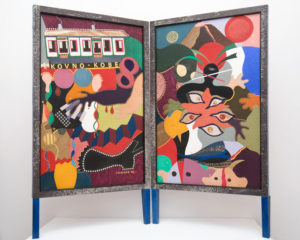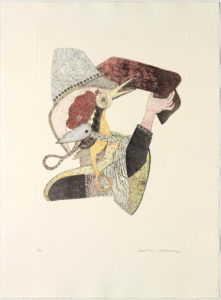
29 Apr Jonathan Hammer: Kovno-Kobe and Tarnish and Shine: Silverpoint Drawings
On view April 29 – July 29, 2012
Two exhibitions of the work of Jonathan Hammer, Kovno-Kobe and Tarnish and Shine: Silverpoint Drawings, will be on view from April 29 – July 29, 2012 at the Derfner Judaica and in the Elma and Milton A. Gilbert Pavilion Gallery, respectively.
Kovno-Kobe includes pastels, drawings, etchings and a bifold screen of diverse animal skins tooled in precious metals that reference events in Lithuania during the Holocaust. The work was inspired by an incident in the summer of 1940, following the Soviet occupation of Lithuania, when the Japanese Consul in Kovno, Chiune (Sempo) Sugihara, issued 2,140 handwritten transit visas to Jewish refugees in the city. The series also references the mass murder of Lithuanian Jews following the German invasion in June 1941.

Jonathan Hammer, Kovno-Kobe, 2010, two-fold screen, diverse leather tooled in precious metals, 40 x 30 x 1 inch. Private Collection, New York.
Drawing on Dada, Surrealism and Neo-Conceptualism, Hammer employs a visual vocabulary of figurative and semi-abstract forms. The finely rendered and ironically delicate images of his etchings, for example, represent both victims and victimizers, evoking violence, mortality and the disintegration of the self. The works conjure the nightmares of the unconscious – puzzle fragments of humanity shaped by patterned animal skins – while contrasting opulence and beauty with violence and death. One may identify the shower head of the gas chambers, the Angel of Death, the ink blots that read as massed corpses, the ubiquitous trains; and such figures of cultural memory as a Jewish patriarch, Mt. Fuji or the Rising Sun, Japanese symbols.
A parallel exhibition, exploring the same themes in new work, Paranormal Nightlight is on view at MIYAKO YOSHINAGA art prospects in Chelsea from April 26 through June 2. It is Hammer’s eighth one-person exhibition in New York City and his second with MIYAKO YOSHINAGA art prospects, and features pastels on paper, an installation on slate, and Hammer’s first exhibited canvases. For further details, visit http://www.miyakoyoshinaga.com.

Jonathan Hammer, Kovno, 2009, from a portfolio of 12 etchings, 29 3/4 x 21 5/8 inches. Courtesy MIYAKO YOSHINAGA art prospects.
Tarnish and Shine: Silverpoint Drawings is the first survey of Hammer’s work in this medium. Hammer’s introduction to metalpoint occurred in 1989 when he began experimenting with precious metals to tool text onto leather. Trained as a bookbinder and leather craftsman, Hammer extended the metalpoint medium to drawing, and in the early 2000s, began a series of silverpoint studies of twigs and botanical subjects. The twig drawings present meticulously rendered branches suspended against blank white space, resembling specimen studies in format, but functioning as portraits in each twig’s unique series of complex knots, knobs and twists. The recurring pathways and lines that twist within empty space evoke the interrelated themes of time passing, direction and movement.
The technique of metalpoint is rooted in medieval manuscript illumination, later reaching the height of its popularity during the Northern and High Renaissance, from the mid-15th to late 16th century. The technique of using precious metals to draw is a highly precise and delicate process. Each drawing is executed on specially treated paper, and once a line has been laid down, it cannot be erased.
Silverpoint drawing is a recurring medium in Hammer’s work, and has taken varied roles. In 1997, he began to explore the symbolism of tarnishing, a quality unique to silverpoint, when he included a series of “tarnished heart” drawings in an installation created in response to a provocative postcard he received from minimalist sculptor Carl Andre. Hammer described these drawings as: “Subtle, sublime but also self-annihilating indictment.” Tarnishing is a chemical reaction that visibly reveals the passage of time as silver oxidizes and darkens, a process that Hammer explores conceptually in his work. The nature of silverpoint is to become warmer in color and softer in edge; ultimately mirroring time elapsing and the subsequent changes it brings about. The idea of darkening, or tarnishing, connotes decay, dilapidation, corrosion – the process of change and transformation – whether of the metal, the physical body, or the heart.
About the artist
Jonathan Hammer is an American artist living in Spain. For 25 years his work has crossed the boundaries of various media and techniques using materials such as exotic skins and porcelain and including books, works on paper (pastels, silverpoints), installation, sculpture, standing screens, photographs and prints. Hammer has had 40 one-person exhibitions (including eight in New York, five with Matthew Marks Gallery) in eight countries, and museum surveys at the Geneva Center for Contemporary Art and the Berkeley Museum. His work is included in the collections of The Museum of Modern Art, New York, the San Francisco Museum of Modern Art, Whitney Museum of American Art and The Museum of Contemporary Art, Los Angeles among others. Hammer is an authority on Dada and has published his critical writing on the subject in Ball and Hammer (Yale University Press, 2002). For further information, visit www.jonathanhammerstudio.com
![]() This exhibition is supported, in part, by public funds from the New York City Department of Cultural Affairs in partnership with the City Council.
This exhibition is supported, in part, by public funds from the New York City Department of Cultural Affairs in partnership with the City Council.

